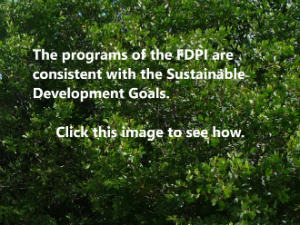This sub-program is the framework through which the Foundation for Development Planning, Inc (FDPI) intends to support initiatives that address the most crucial social development issues in the United States Virgin Islands (USVI). (Download Concept Note)
For the purposes of this sub-program, the FDPI defines social development broadly to mean development that focuses on human well-being, which necessarily includes the strategies and mechanisms a society uses to fulfill individual and collective aspirations and needs.
The sub-program will focus on initiatives that facilitate social development over the long term, especially initiatives that are designed with the objective of creating a just and sustainable society. The program will be delivered primarily through collective action with individuals and organizations in the three social sectors (public, private, and civil).
Focus Areas for the U.S. Virgin Islands Social Development Sub-Program
The well-being of a community is generally dependent on:
- Choices made regarding development goals and strategies,
- The capacity of government to design and deliver appropriate public policy,
- Choices made by residents as a collective,
- The supporting physical and social infrastructure, and
- The quality of the environment.
Therefore, solutions to the challenges require the use of multiple modalities, with collective action aimed particularly at the points of intersection.
The sub-program will be delivered over a decennial timeframe and will function as the framework for translating the FDPI’s thematic programs, such as climate change and disaster risk reduction, as well as responding to local priorities. The sub-program will include the areas of focus described below.
- U.S. Virgin Islands Social Development Agenda
It is generally agreed that sustainable development requires integration of economic growth, social well-being, and environmental protection. Like most small nations experiencing development challenges, the USVI tends to focus on the urgent demands of an economic strategy, with less clear articulation of how economic growth translates to social well-being.
The FDPI intends to contribute to efforts to articulate and design a social development agenda through the following mechanisms:
- Advocacy through community conversations, by participating in in-person gatherings (community fora) as appropriate and using online community discussion platforms, such as Under the Markets.
- Participation in initiatives to prepare long-term development strategies, particularly strategies that mainstream the concept and practice of sustainable development.
- Supporting social and economic development initiatives appropriate for small communities, especially vulnerable communities where survival and sustainability are highly dependent on a shared sense of community and collective action.
- Capacity Development for the Civil Society/Nonprofit Sector
Initiatives to address cooperation and coordination in the civil society sector in the USVI include the formation of the Nonprofit Consortium on St. Croix and an attempt to form an association of nonprofits.
Though some needs (e.g. convening and targeted community interventions) are probably best addressed through island-specific collaboration, other needs (e.g. policy analysis, advocacy, capacity development) are territory-wide and could be addressed through sector-wide collaboration.
The FDPI will support capacity development initiatives in the USVI civil society sector as appropriate and practicable.
- Social Infrastructure
For the purposes of this sub-program, the FDPI defines social infrastructure as the institutions, services, facilities, and environmental conditions that together form the foundation for community well-being by providing a healthy environment, fostering social connections, enabling community engagement, and supporting individual and community development.
The FDPI’s input to development of social infrastructure in the USVI will be informed by the concept of Equitable Infrastructure, a concept that frames development through the lens of human well-being. As such, the concept can be applied to community participation in public policy and decision making on development strategies, as well as design of collective action for community development.
The sub-program will prioritize support for existing and new institutions and institutional arrangements for:
- Public policy analysis and development.
- Community placemaking, mobilization, and development.
- Research and data collection for statistical analysis and long-range planning.
- Collective evaluation exercises where appropriate.
- Cost-benefit analysis and risk assessment for routine development decision making.
- Documentation of processes and lessons learned which may be useful to organizations and communities engaged in similar programs.
Financing the U.S. Virgin Islands Social Development Sub-Program
The three community foundations in the U.S. Virgin Islands (USVI) provide funding to local civil society organizations. The FDPI will not function in that role, nor will it compete for funding provided by the three community foundations.
The FDPI will fund the sub-program by applying for grants and establishing a permanent fund.
Engagement Mechanisms
The sub-program will be delivered through multiple modalities, requiring the FDPI to cooperate with individuals, institutions, and networks in the public, private, and civil sectors. As previously stated, the sub-program will support existing initiatives that fit within the program scope, as well as facilitate development of new initiatives and institutional arrangements where appropriate.
To ensure that the sub-program addresses the needs of the USVI, the FDPI proposes the following arrangements for community input to program design and delivery:
- Formation of a Community Advisory Committee for routine, formal input to guide the sub-program.
- Periodic meetings of the chief executive officers of the USVI nonprofits that are engaged in community service/development.
- A triennial or quinquennial meeting of USVI nonprofits engaged in community service/development to focus on periodic assessment of the ‘state of the community’ and for forward planning.
- Routine public engagement.
